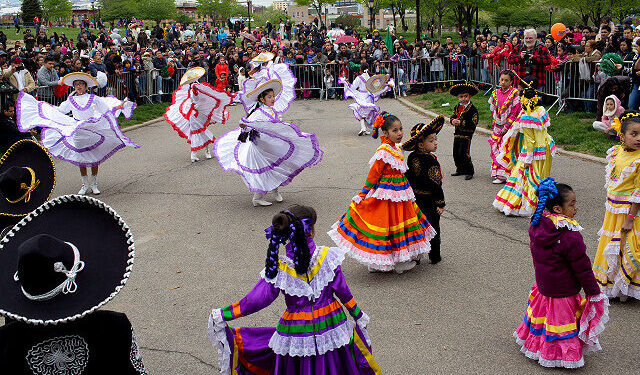As the Biden administration continues to fumble its handling of illegal immigration, some Democrat-run cities are now dealing with the direct fallout—fear, confusion, and the quiet cancellation of community events that once brought hundreds of thousands together.
In cities like Chicago, once vibrant Cinco de Mayo parades and festivals are being canceled or significantly toned down. Why? Organizers say fear of Immigration and Customs Enforcement (ICE) has gripped many in the Hispanic community—some even say people are considering returning to Mexico altogether.
In an interview with CNN, Hector Escobar, president of the Casa Puebla and the Cermak Road Chamber of Commerce, painted a bleak picture of how residents are reacting.
“Our people are very scared,” he said. “Honestly, they’re saying they don’t want to go to work. They have to go to work because they have to feed their families. So, if they both were working, now one person is working.”
Escobar made the difficult decision to cancel Chicago’s annual Cinco de Mayo parade in Little Village, an event that normally draws up to 300,000 people. The reason? “Fear,” he says, pure and simple.
“How about the parade? How about the festivities? And they say, ‘Well, if we’re scared to go to work, I don’t think it’s nothing to celebrate.’ So, that took us to the decision over money,” he said.
What’s more concerning, Escobar adds, is that some residents are considering leaving the country altogether.
“Believe me, some people are already thinking about going back to Mexico,” he added. “The governor of Puebla, Alejandro Armenta, is going to open an office here in Chicago to help people who want to go back to Mexico and try to do some business or try to put the kids back to school in Mexico.”
Chicago has long labeled itself a “Sanctuary City”, which means it forbids local law enforcement from working with ICE on enforcing federal immigration laws. However, despite the so-called protections offered under sanctuary policies, fear still dominates the streets.
This raises an important question: If these sanctuary policies were working, why are so many living in fear?
The answer may lie in widespread confusion and the unintended consequences of mixed messaging. According to UnidosUS, the nation’s largest Hispanic civil rights group, 43% of Latino voters fear that ICE will arrest people—even if they are U.S. citizens. That statistic alone speaks volumes about the uncertainty fostered by a lack of clear immigration enforcement and leadership at the federal level.
Chicago isn’t alone. The City of Philadelphia has also canceled its El Carnaval de Puebla—another celebration of Mexican heritage that typically takes place in April.
Festival organizer Olga Renteria said the atmosphere just wasn’t right for a large public celebration. People, she said, are being understandably cautious.
In Oregon, the annual Latino Fest scheduled for December in the city of Madras was also canceled. The decision was explained by Catalina Sánchez Frank, executive director of the Latino Community Association.
“It’s a celebration of joy, and when people are experiencing anxiety around possible fear of deportation, then we feel it’s more responsible and ethical to not celebrate this year,” she said.
While the mainstream media is quick to paint this fear as a new development, the real cause may stem from the strong immigration enforcement under President Donald Trump—policies that focused on law, order, and national security.
During the first 100 days of President Trump’s presidency, ICE detained nearly 66,500 migrants who had entered the U.S. illegally.
These efforts aimed to crack down on illegal immigration, prioritize the deportation of criminals, and restore confidence in the rule of law. The approach earned praise from conservatives and many working-class Americans who believe immigration laws should be enforced equally and public safety should come first.
ICE Enforcement and Removal Operations Fact Sheet – Trump Era
What we’re seeing now is a direct reflection of the Democratic leadership’s failure to provide real solutions. Sanctuary policies may earn applause from the far-left, but on the ground, they breed fear, uncertainty, and mistrust.
The irony? While Democrats grandstand about being the party of inclusion and celebration, it’s under their leadership that cultural events are now being canceled out of fear. Not by ICE. Not by conservatives. But by the very communities that are supposed to feel “protected.”
In the end, this is not just about Cinco de Mayo. It’s about leadership. It’s about the consequences of empty promises and confused priorities.
And it’s a reminder that if we want safe, thriving communities, it starts with respecting the law and putting America first.




















